site search
online catalog
NEAR MINT SILVER PLATED AND GILT-ETCHED EAGLE-POMMEL PRESENTATION 1902 OFFICER’S SWORD OF MAJ. ALFRED B. WELCH, 9th U.S. FIELD ARTILLERY

Hover to zoom



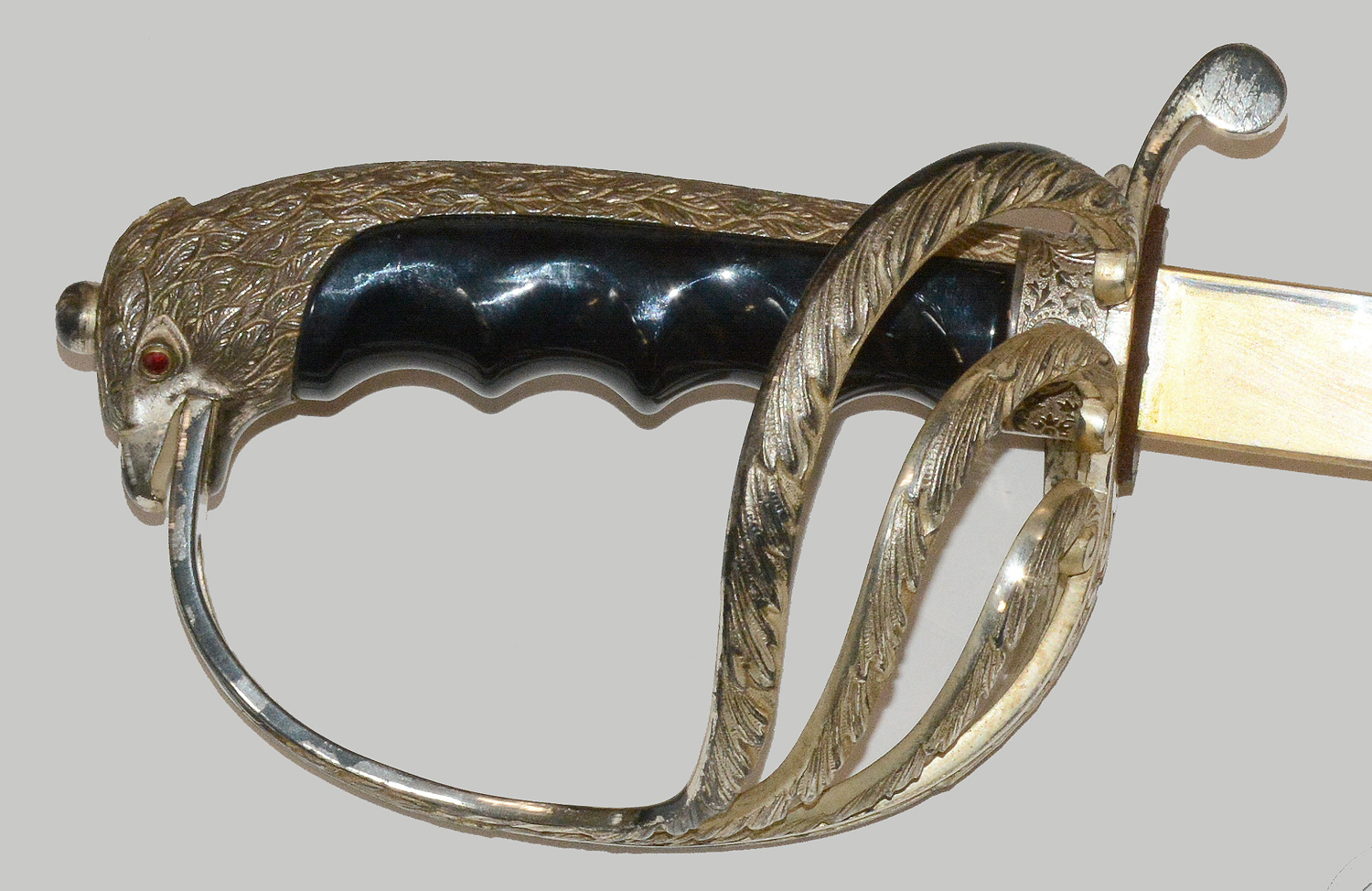
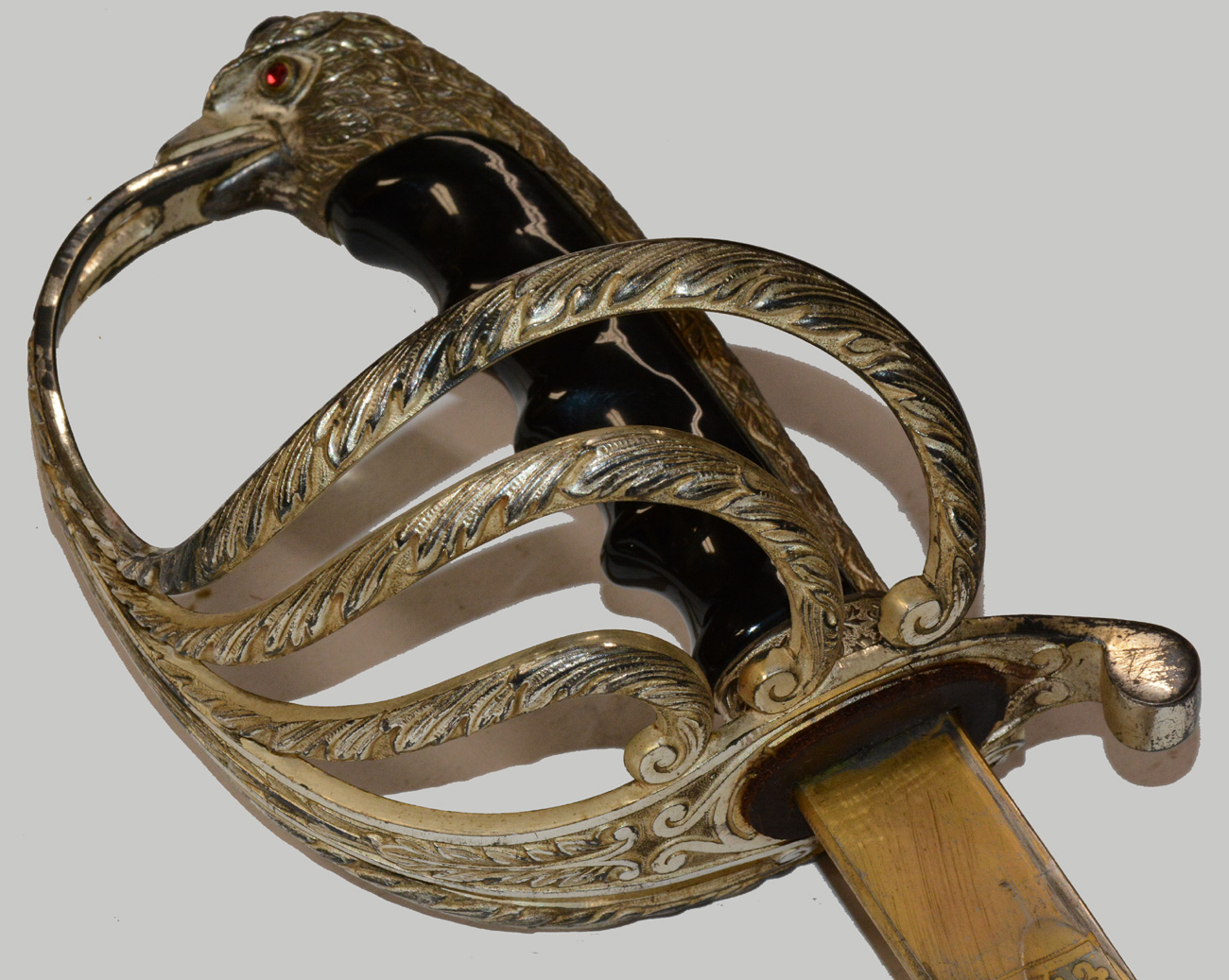
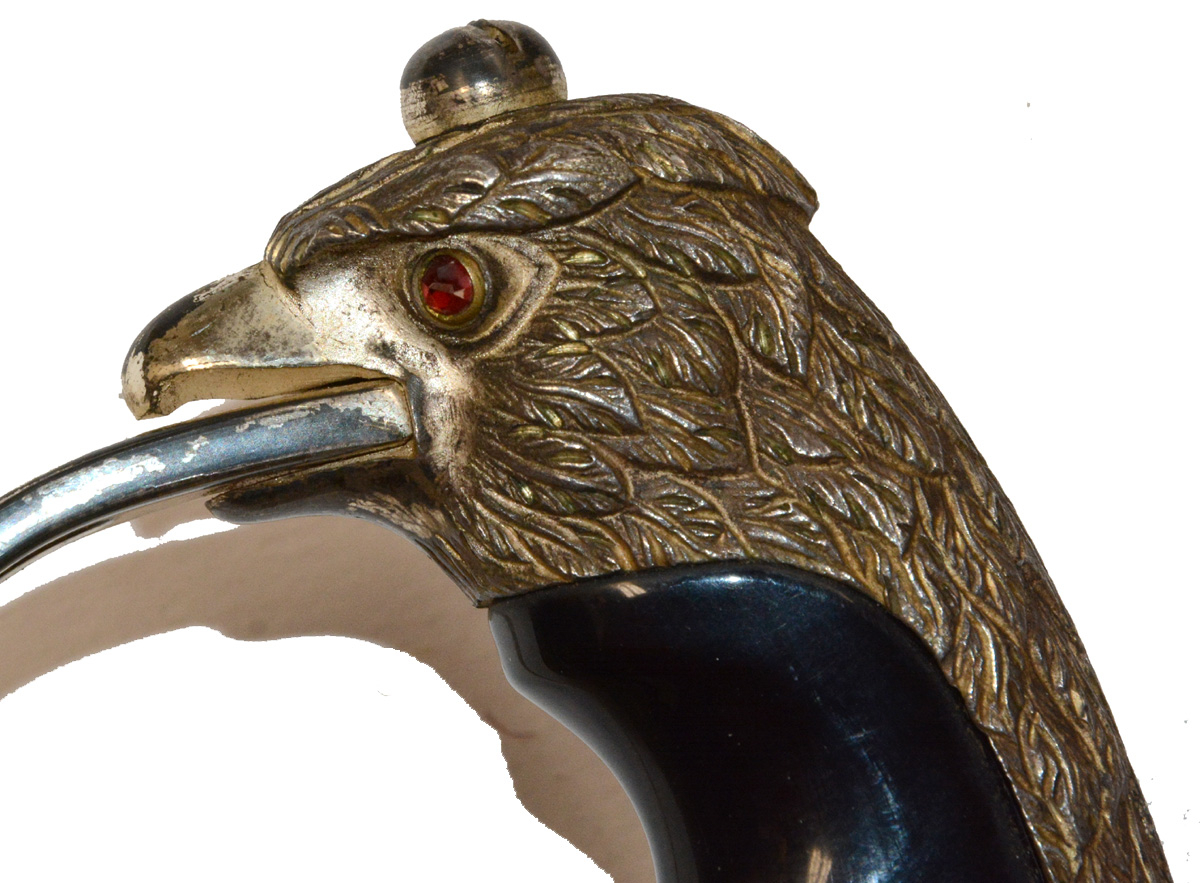
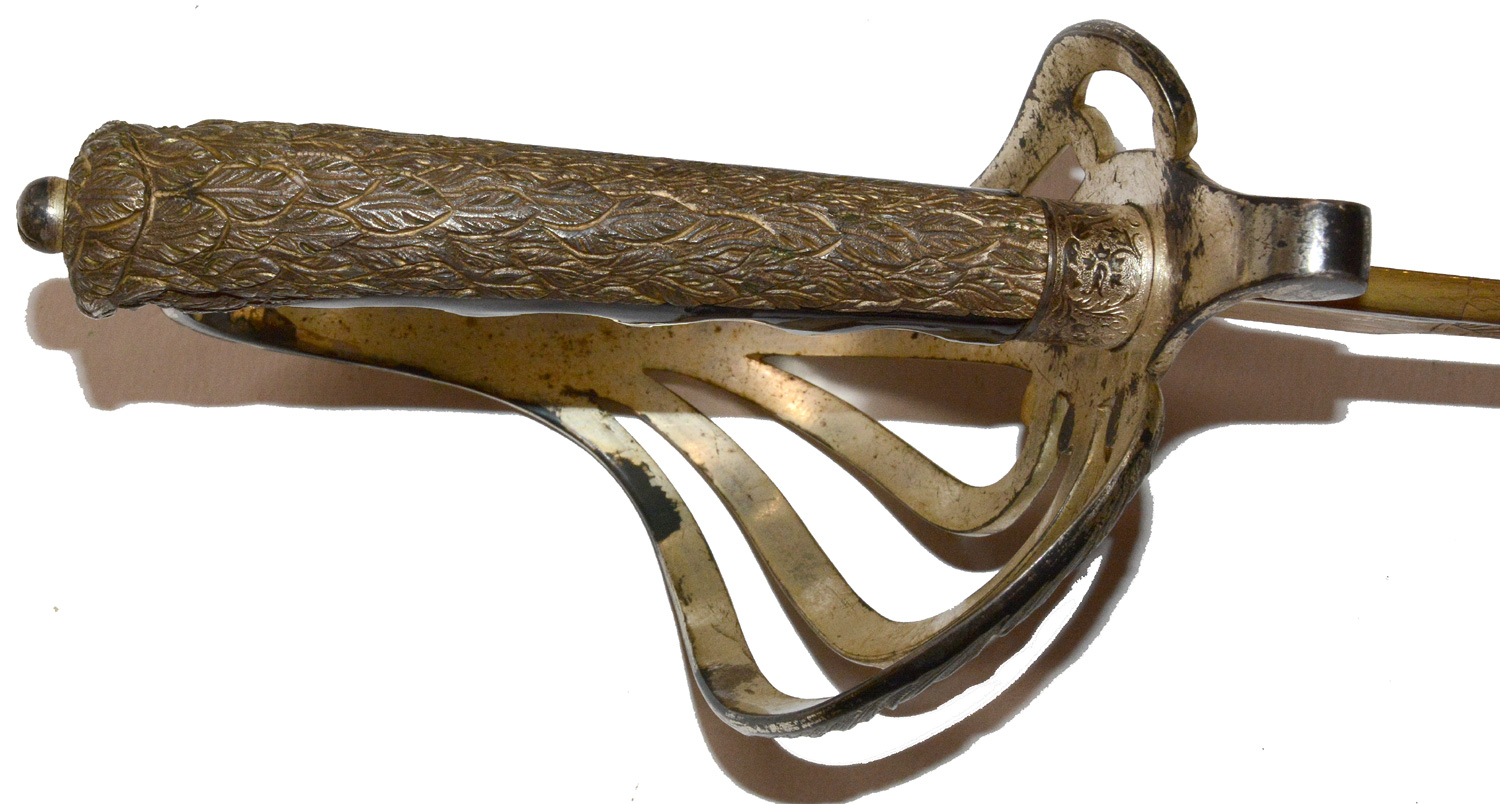
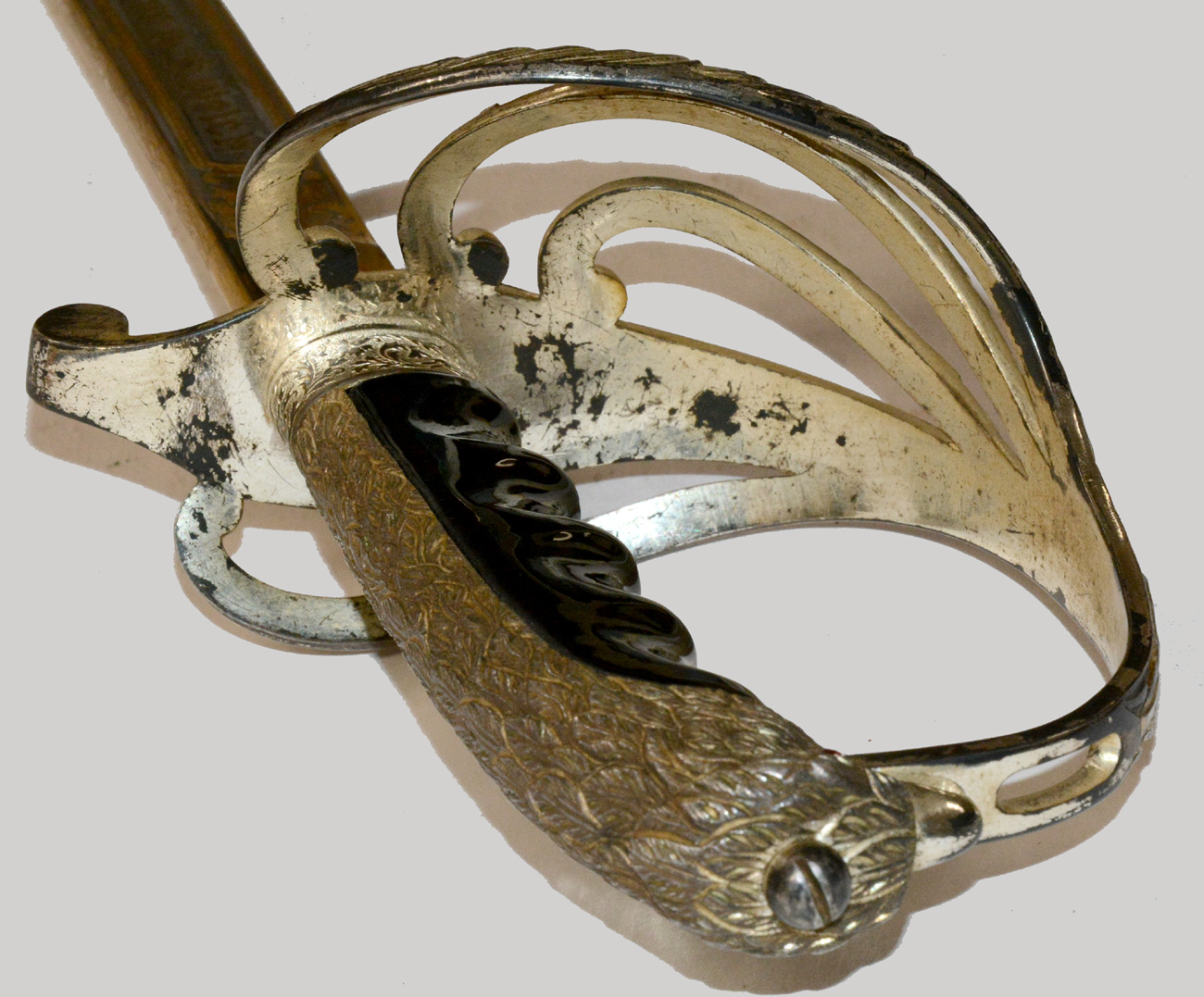
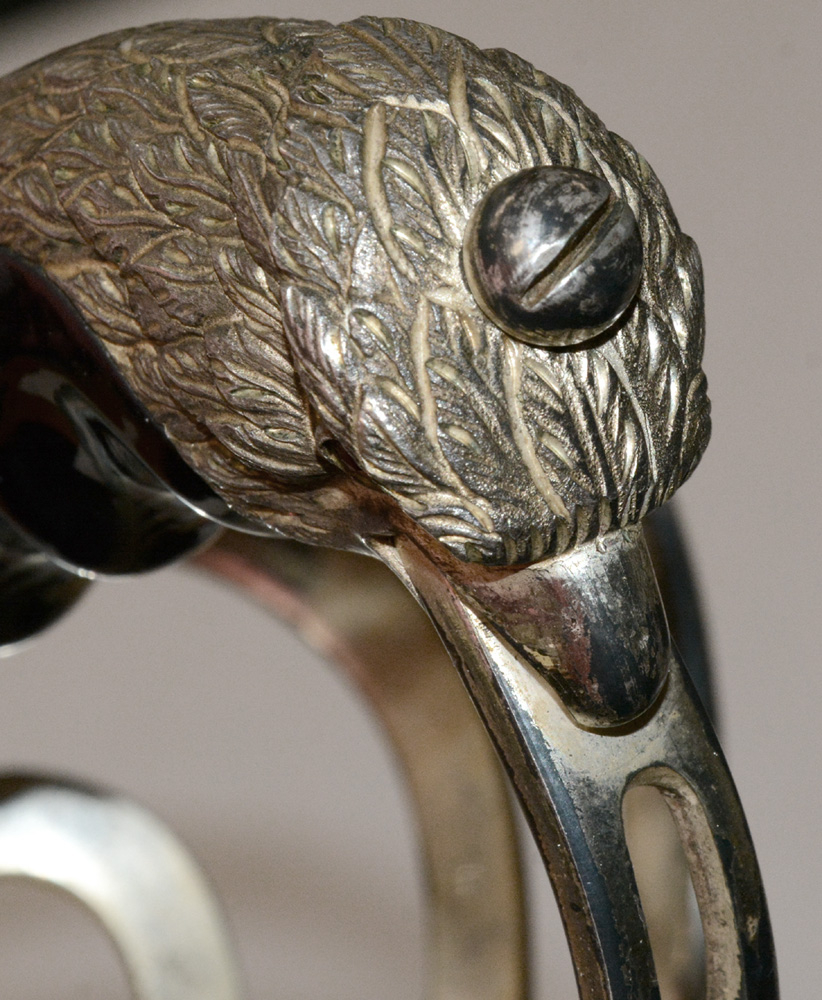


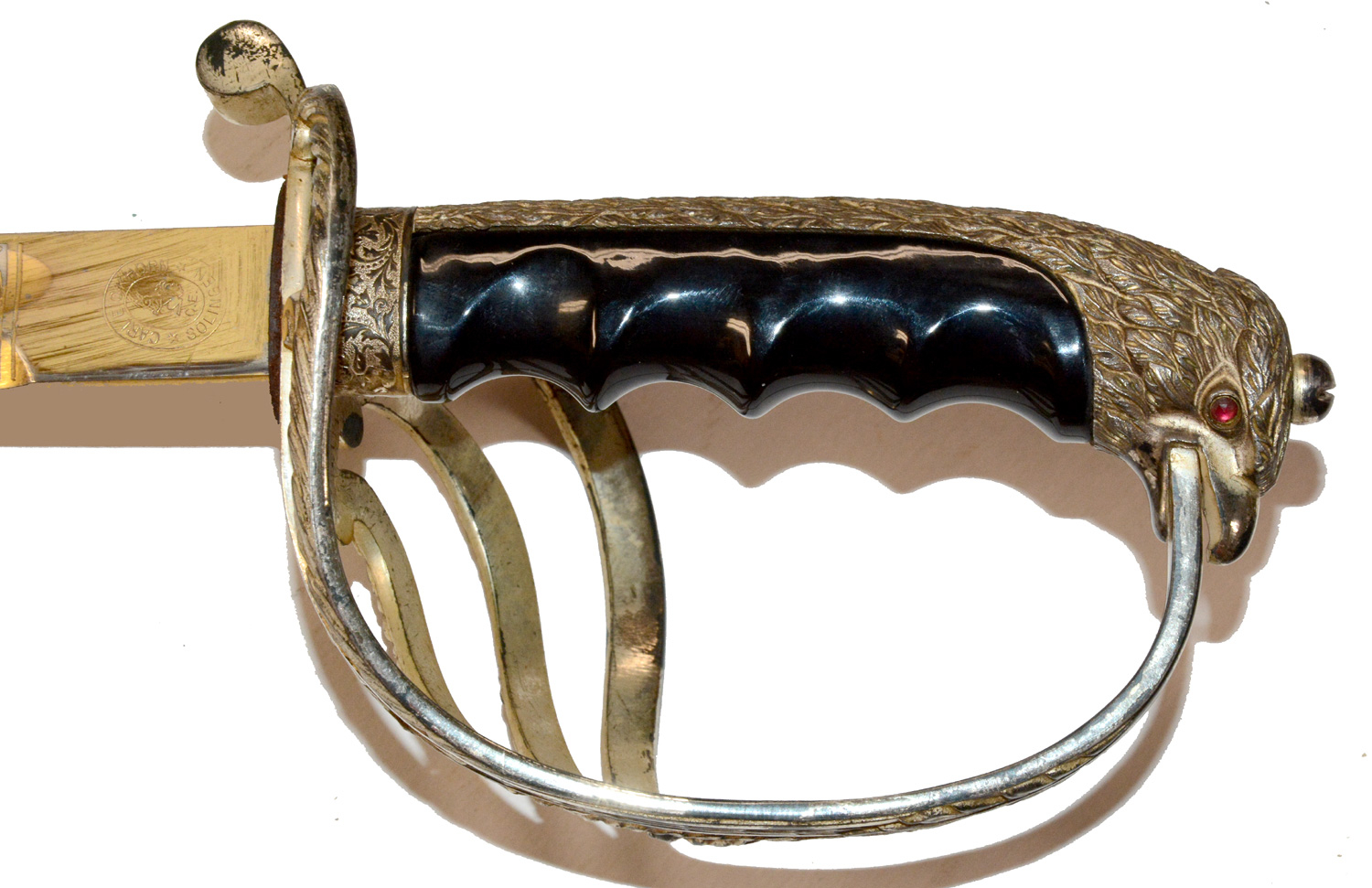
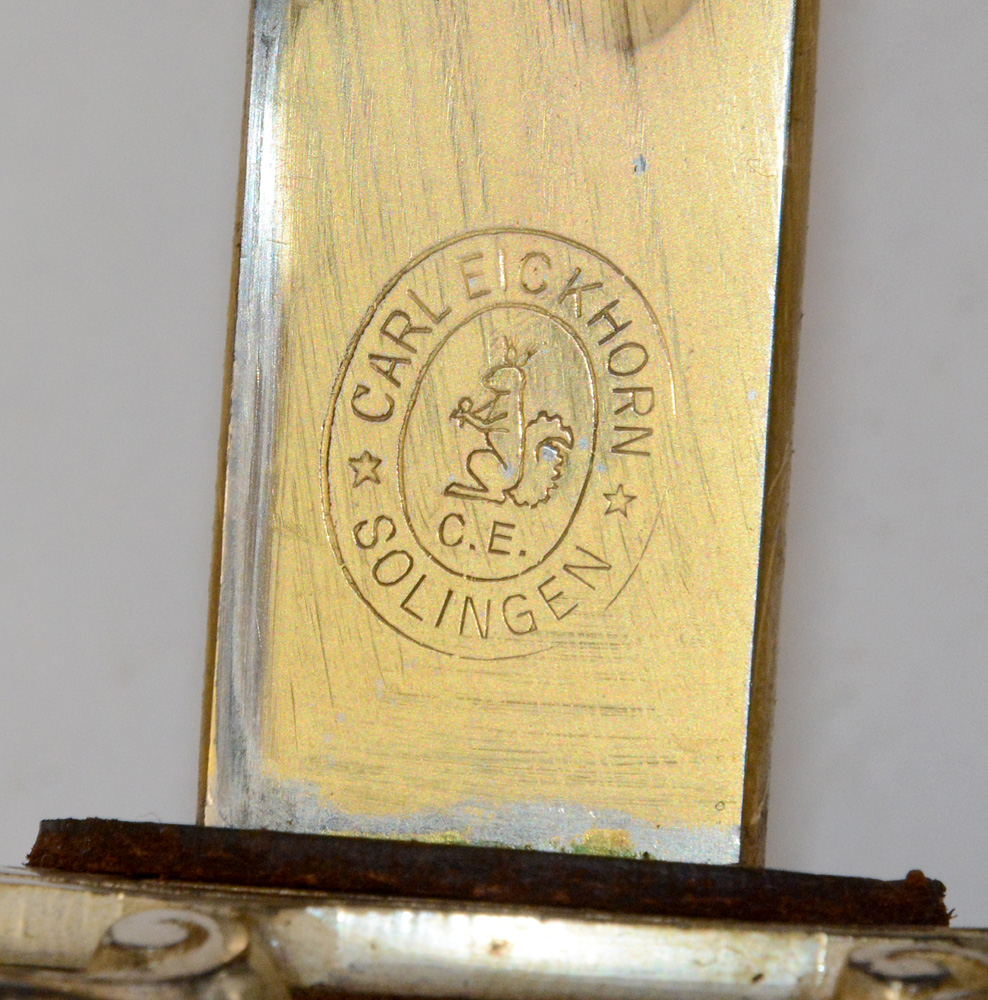


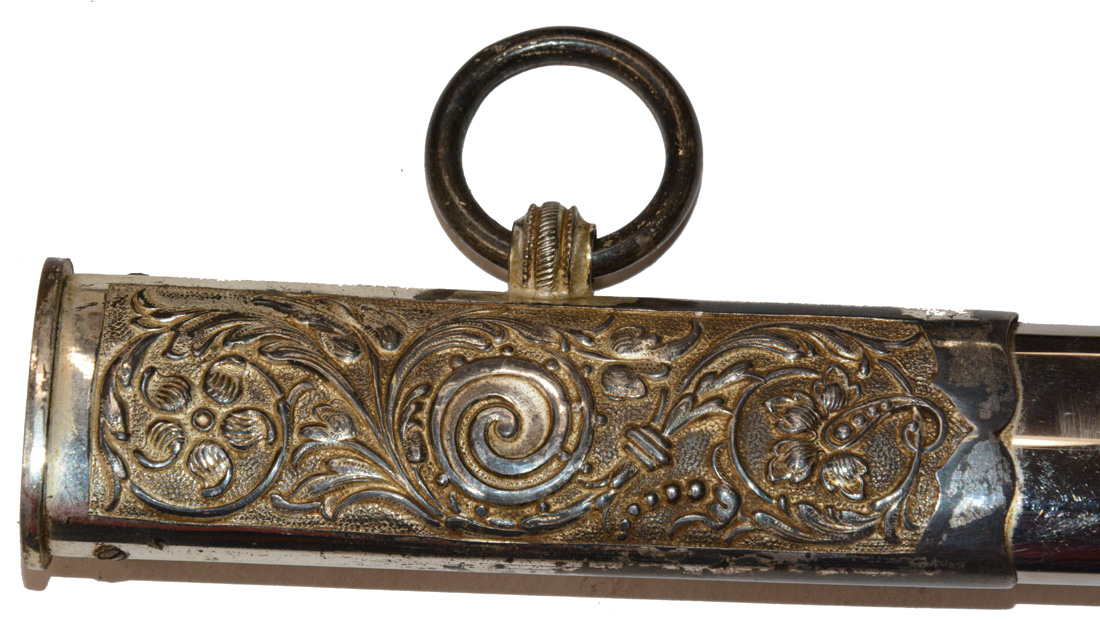

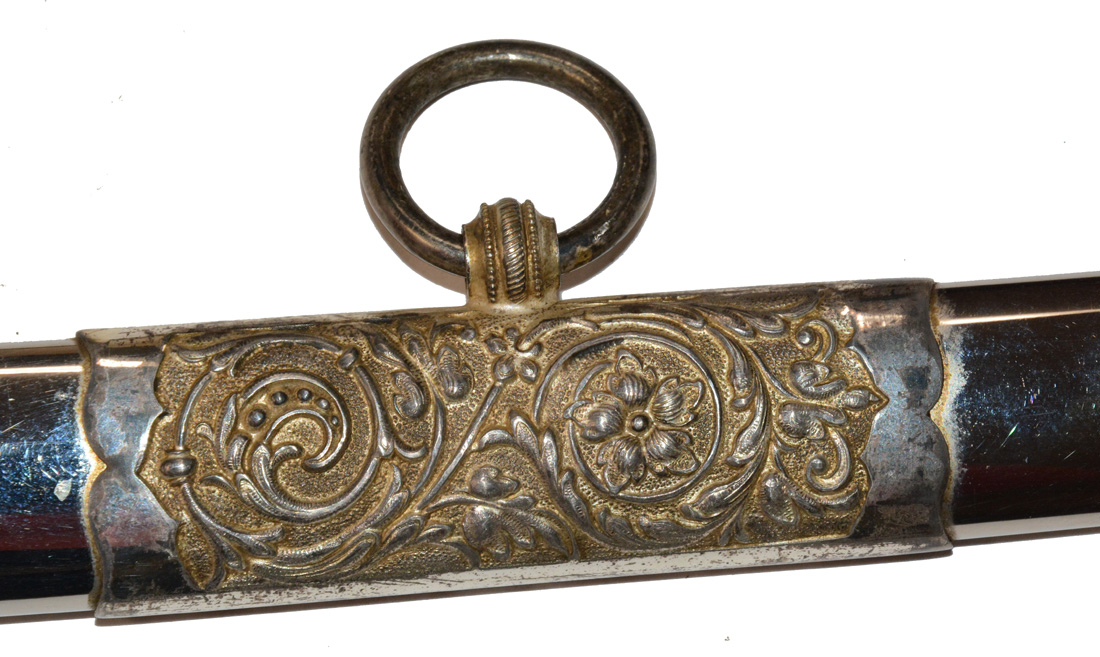

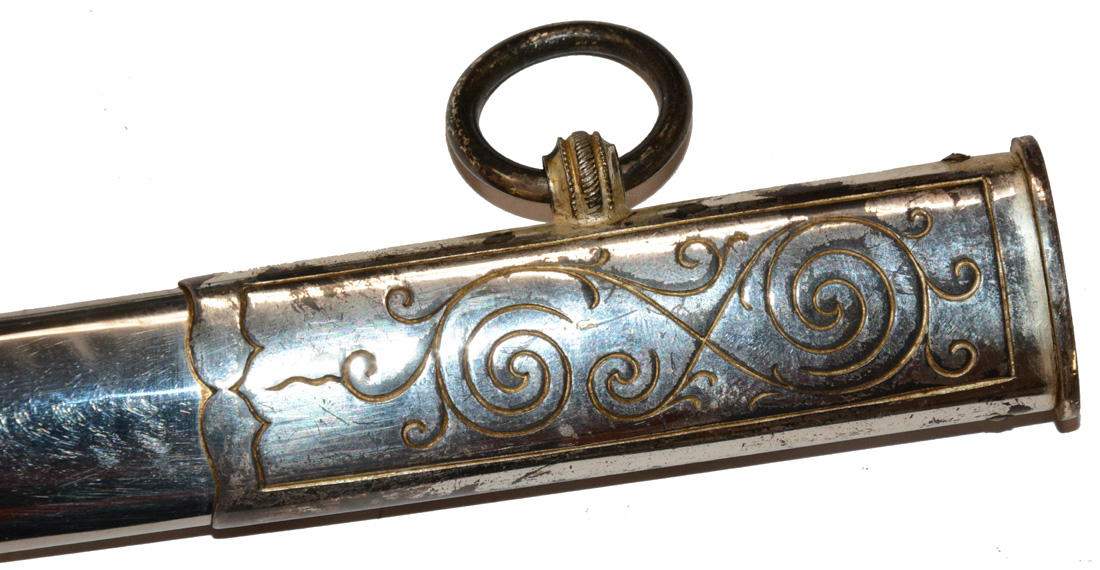

$2,295.00
Quantity Available: 1
Item Code: 2024-2063
Shipping: Determined by Method & Location of buyer
To Order:
Call 717-334-0347,
Fax 717-334-5016, or E-mail
This is a beautiful high-end example of the U.S. 1902 officer’s saber made by Eickorn of Solingen in excellent to near mint condition. The hilt and guard are steel, as mandated in December 1902, but the scabbard body is bright rather than dull nickel and both the scabbard mounts and the hilt have been silver plated. The pommel is cast in the form of an eagle’s head, which has been given red gemstone eyes, and the backstrap is fully covered with feathers down to the ferrule, which is decorated with floral scrolls. The exterior of the guard and side branches are decorated with geometric and floral scrolls in relief. There are a few losses to the plating, mostly on the interior of the guard branches and the edges of scabbard mounts. The grip is excellent. The blade pad is in place.
The blade is etched and gold washed to highlight the motifs with the exception of the recipient’s name, “Major A.B. Welch,” which is left bright etched in a rectangular cartouche on the reverse. The etching is done on a frosted background that still shows very nicely. On both sides a leafy plant appears near the ricasso and floral scrolls fill the space between two main panels and finish off the etching. On the reverse is the cartouche with the recipient’s name and another with the Great Seal of the U.S. On the obverse at bottom is a stand of arms and an entwined U.S. above. The cartouches carrying the Great Seal and the U.S. have heart-shaped Arabesque ends, as do the upper terminals of the etched panels. The metal is smooth and the etching vivid. Above the etched panels the metal is smooth and bright. The Eickhorn maker’s mark appears under the gold wash on the reverse ricasso. The scabbard mounts bear open floral scrolls, engraved on the drag and raised on the middle and upper mounts, which have their carrying rings in place. Between the two ring mounts the scabbard is engraved on the obverse, “PRESENTED TO / MAJ. ALFRED B. WELCH / COMMANDING OFFICER 9TH F.A. / BY OFFICERS OF HIS REGIMENT.”
The presentation dates to August 1929 during the summer training of the 9th Field Artillery, then “Regular Army Inactive,” consisting of Organized Reserve personnel organized in one battalion, as part of the 7th Field Artillery Brigade at Fort Riley, KS.
(It seems only the headquarters and headquarters battery were present.) Welch had long military service and at the time was in the Reserve Officer Corps. The actual sword was not delivered until later in the year. A December 1929 Bismark, ND, newspaper describes what can only be this sword on display in store window in Welch’s hometown of Mandan, calling it a, “Swedish silver scabbard and sabre, trimmed in gold, which was recently received by Major Alfred B. Welch…” The paper maintains it had been presented by 65 officers of the Seventh Artillery Brigade, headquarters of the Seventh Artillery Brigade, and the 307th Observation Battalion. Major Welch was in command of the donors at Fort Riley, Kan., last August…” and mentions the sword, or scabbard, as engraved, “Major Alfred B. Welch.” The 9th FA is known to have trained in summer 1929 at Fort Riley, where the 7th FA Brigade did summer training “most years.” An upper date for the presentation would be 1930 in any case, for by that time Welch seems to have made colonel.
Alfred Burton Welch was born in Iowa 26 September 1874 and had active service in the Philippine Insurrection in the 1st Washington Infantry. We include a copy of his 1898-1899 journal, which is entertaining and has lots of interesting details on the organization of the regiment, his adventures in San Francisco of the 1890s while waiting to ship out, and his experiences in the Philippines, where he saw a fair amount of action from January to July 1899, the regiment losing one officer and 17 enlisted men killed in action as well as 8 mortally wounded, along with 5 officers and 89 enlisted men who were wounded but recovered. There are also details of a visit to Japan on the way home.
In 1905 he moved to Mandan, ND, having spent much of his childhood in the region.
He joined the N.D. National Guard, helping raise Company F, 1st N.D. National Guard in 1906 and gained a commission as Captain of Co. A, 1st N.D. National Guard in 1913. This unit was activated for Mexican Border service from June 1916 to February 1917, after which he returned home and resumed National Guard status until June 1917 when he was assigned as Captain of Co. I 2nd North Dakota, activated for Federal service for World War One. Welch served in Europe from December 1917 to August 1919, participating in the Champagne-Marne Defensive, Aisne-Marne Offensive, and Meuse-Argonne Offensive, in the 116th Ammunition Train, 41st Division, though he spent some time as aide to Gen. Liggett. He was reportedly advanced to Major, though discharged in August 1919 as a captain in the 3rd Ammunition Train, attached to the Field Artillery, which explains his postwar artillery association.
How long Welch maintained his military connections is unclear, but a 1933 photo of him at the Government Agency at Elbowoods, N.D., shows him in uniform and carrying what seems to be this sword. By 1940, however, he would have been 65 and surely on the retired list. In civilian life he had been a storekeeper and the postmaster at Mandan from 1923 to 1934. He is very well known from his relations with the Sioux tribe, having been formally adopted into the tribe as the son of chief John Grass in 1913, which eventually made him a chief as well in 1918. In 1917, he actually tried to raise a battalion of cavalry among the Sioux for service in Europe. That project came to naught, but many enlisted in the army under his influence. He kept extensive journals and wrote dozens of articles and papers, interviewing members of the tribe, compiling an oral history of the tribe, rebutting misconceptions, etc. Many of his writings are available online. He also assembled a large collection of artifacts. He died in Bismarck June 30, 1945.
This is a super example of a 1902 with a great presentation to a very interesting character. [sr] [ph:L]
~~~~~~~~~~~~~~~~~~~~~~~~~~~~~~~~~~~
THIS ITEM, AS WITH ALL OTHER ITEMS AVAILABLE ON OUR WEB SITE,
MAY BE PURCHASED THROUGH OUR LAYAWAY PROGRAM.
CLICK HERE FOR OUR POLICIES AND TERMS.
THANK YOU!
Inquire About NEAR MINT SILVER PLATED AND GILT-ETCHED EAGLE-POMMEL PRESENTATION 1902 OFFICER’S SWORD OF MAJ. ALFRED B. WELCH, 9th U.S. FIELD ARTILLERY
Most Popular
Historical Firearms Stolen From The National Civil War Museum In Harrisburg, Pa »
Theft From Gravesite Of Gen. John Reynolds »
Selection Of Unframed Prints By Don Troiani »
Fine Condition Brass Infantry Bugle Insignia »
featured item
5th NEW YORK NATIONAL GUARD COMPANY E FLANK MARKER
This very attractive blue silk marker with gold fringe and embroidered unit designation comes with a 1995 letter from flag authority Howard Madaus, a 2004 treatment report by Textile Preservation Associates, the well-known and highly respected… (1179-014). Learn More »


